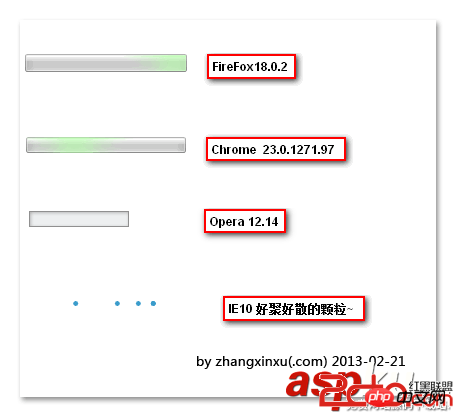
1. Basic understanding of progress element
1. Basic UI
The progress element belongs to the HTML5 family and refers to progress bar. Supported by IE10+ and other reliable browsers. The following is a simple code:
1.<progress>o(︶︿︶)o</progress>
is a very impressive progress bar. Some people are wondering: "Oh~ why do I see a character emoticon?" Well... I can only say to you: "I despise you, you are so reluctant to use a more reliable browser?!"
This default The effect is different under different browsers, as shown in the following screenshots (under window 7):

The slow-moving convergence effect of IE10 particles is still It's quite eye-catching.
2. Basic attributes
max, value, position, and labels.
(1) max refers to the maximum value. If it is defaulted, the progress value range is from 0.0~1.0. If set to max=100, the progress value range is from 0~100.
(2) value is the value. If max=100, value=50, the progress is just right. half. The presence or absence of the value attribute determines whether the progress progress bar is deterministic. What's the meaning? For example, has no value and is uncertain, so under the IE10 browser it looks like an infinite loop of dot animation; however, once there is a value attribute (even if it has no value), such as < progress value>, is also considered to be confirmed, and the virtual point animation enters the fairy mode——>The bar changes, as shown in the screenshot below:
(3) position is read-only Attribute, as the name implies, the current progress position is the value of value / max. If the progress bar is uncertain, the value is -1.
(4) labels is also a read-only attribute, and what is obtained is the label elements pointing to the progress element. For example, document.querySelector("progress").labels returns an HTMLCollection, and the following is a screenshot of one of my tests (taken from the Opera browser, currently FireFox18.0.2 and IE10 do not seem to support it).
2. Progress element compatibility processing example
html code
1.<progress max="100" value="20"><ie style="max-width:90%"></ie></progress>
css compatible code
CSS Code copy content to the clipboard
1.progress {
2. display: inline-block;
3. width: 160px;
4. height: 20px;
5. border: 1px solid #0064B4;
6. background-color:#e6e6e6;
7. color: #0064B4; /*IE10*/
8.}
9./*ie6-ie9*/
10.progress ie {
11. display:block;
12. height: 100%;
13. background: #0064B4;
14.}
15.progress::-moz-progress-bar { background: #0064B4; }
16.progress::-webkit-progress-bar { background: #e6e6e6; }
17.progress::-webkit-progress-value { background: #0064B4; }Basic It perfectly solves the differences between browsers.
The above is the detailed content of Introduction to the progress element of the progress bar in HTML5 and its compatibility processing. For more information, please follow other related articles on the PHP Chinese website!
 What are the production methods of html5 animation production?
What are the production methods of html5 animation production?
 The difference between HTML and HTML5
The difference between HTML and HTML5
 National Anti-Fraud Center Call Warning
National Anti-Fraud Center Call Warning
 Will the Bitcoin inscription disappear?
Will the Bitcoin inscription disappear?
 How to buy and sell Bitcoin on okex
How to buy and sell Bitcoin on okex
 403forbidden solution
403forbidden solution
 How to solve problems when parsing packages
How to solve problems when parsing packages
 propertydescriptor usage
propertydescriptor usage




